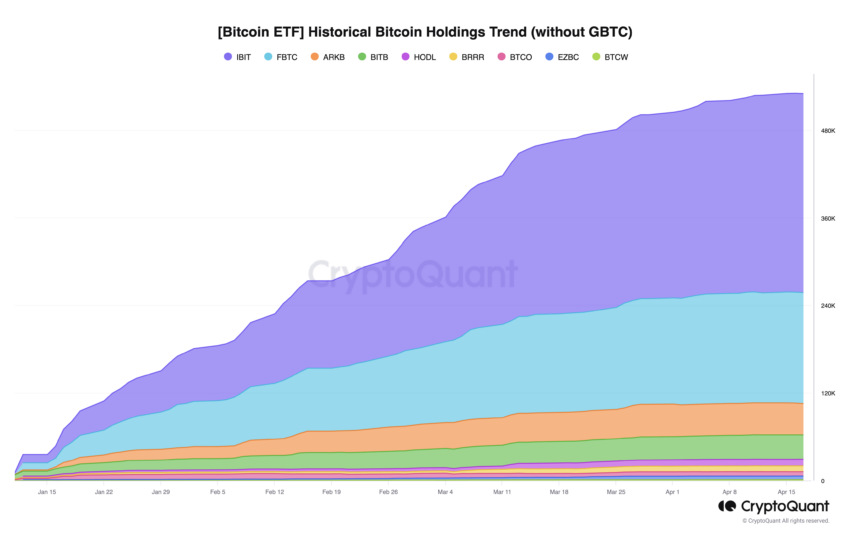This Is Why Bitcoin Is Becoming Too Centralized

The ethos of Bitcoin as a decentralized cryptocurrency is under threat, according to Kadan Stadelmann, the CTO of Komodo, who has voiced concerns to BeInCrypto over the increasing centralization within the network.
This shift from its foundational principles could redefine Bitcoin’s role in the financial landscape.
One Huge Mining Powerhouse
Since its inception by Satoshi Nakamoto in 2009, Bitcoin has been celebrated as a pioneering force for financial autonomy and freedom, free from the control of centralized financial institutions. However, recent developments suggest a departure from this ideal, steering Bitcoin towards what Stadelmann terms a “centralized paradox.”
One of the most significant indicators of this trend is the concentration of mining power within a handful of mining pools. Foundry USA and Antpool, for example, now control over 50% of Bitcoin’s total hashrate. This concentration is even more pronounced when considering that more than 80% of mining power is held by just five pools.
Such dominance by a few undermines the decentralized nature that Bitcoin was supposed to exemplify.
The influence of government and regulatory bodies also complicates the picture. For instance, North America’s Blockseer pool not only meets but exceeds the US Government’s Office of Foreign Assets Control (OFAC) compliance standards.
Read more: Crypto Regulation: What Are the Benefits and Drawbacks?
This compliance introduces a level of government oversight and control that was previously absent, diluting the decentralized promise of Bitcoin.
“In short, a minority of miners control substantial resources, undermining the decentralized ethos that Bitcoin claims to uphold. This scenario questions the egalitarian nature that Bitcoin was purported to represent and opens discussions about the true beneficiaries of this digital currency,” Stadelmann told BeInCrypto.
American Institutions Take Over
Stadelmann also believes that the growing engagement of major financial institutions in Bitcoin mining operations signals another shift towards centralization.
BlackRock has acquired significant shares in two leading Bitcoin mining companies, 6.71% in Marathon Digital Holdings and 6.61% in Riot Blockchain, with investments nearing $383 million. Since 2014, Fidelity Group has been actively mining Bitcoin. On the other hand, Vanguard holds roughly 17.9 million shares in Riot Platforms and 17.5 million shares in Marathon Digital.
This is not just about financial investment. In January, BlackRock further integrated Bitcoin into the mainstream financial market by filing documents with the SEC to include a spot Bitcoin exchange-traded fund (ETF). This new financial instrument now manages 272,800 BTC, valued at $17.20 billion.
This figure does not even include holdings from similar products managed by other entities.
“The increasing influence of these financial giants in Bitcoin mining operations could lead to a scenario where the decision-making and control over the network become concentrated in the hands of a few, rather than being distributed among a diverse group of participants,” Stadelmann added.

The core of the problem lies in the stark contrast between Bitcoin’s current trajectory and its original purpose. Bitcoin’s original vision was to operate as a decentralized network, independent of traditional financial systems. However, increasing centralization might draw it closer to the very systems it aimed to circumvent.
Read more: 5 Best Platforms To Buy Bitcoin Mining Stocks Ahead of 2024 Halving
This centralization is not just a technical issue but a fundamental question about the nature and future of Bitcoin. It challenges the decentralized ethos that has been a significant draw for investors and users attracted to the idea of a financial system free from traditional constraints.
Therefore, the call from Stadelmann for a robust discussion within the Bitcoin community is timely and essential.
Disclaimer
Following the Trust Project guidelines, this feature article presents opinions and perspectives from industry experts or individuals. BeInCrypto is dedicated to transparent reporting, but the views expressed in this article do not necessarily reflect those of BeInCrypto or its staff. Readers should verify information independently and consult with a professional before making decisions based on this content. Please note that our Terms and Conditions, Privacy Policy, and Disclaimers have been updated.















